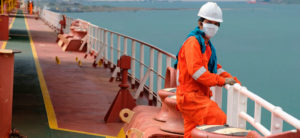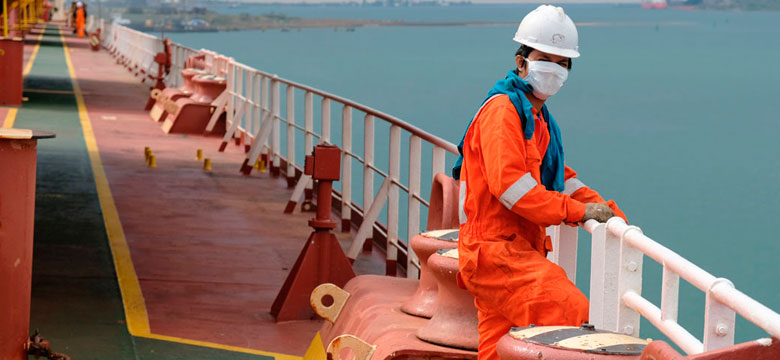
Around the world, upward of 400,000 seafarers — and counting — are serving beyond their contracts as crew changes still don’t occur as regularly as they did before the COVID-19 pandemic.
“There are more than 300,000 seafarers essentially indentured on their ships because they can’t get relieved,” said Donald Marcus, president of the International Organization of Masters, Mates & Pilots (MM&P), addressing coronavirus-related travel restrictions that limit crew changes in many countries. “It could be a key problem in the global supply chain — and a lack of humanity — if this keeps up much longer.”
Guy Platten, secretary-general of the International Chamber of Shipping (ICS), said the group estimates that 400,000 mariners are beyond their contracts now, with the numbers still rising “because we’re not doing as many crew changes. It could go as high as 500,000, with another 500,000 waiting to get on board, so it could go as high as 1 million seafarers affected.”
Both the ICS and MM&P emphasize the importance of seafarers being designated as essential or key workers since they handle more than 80 percent of the world’s trade, including medical supplies, food, fuel and other items crucial to economic recovery. The United States and Canada are among the 42 countries classifying seafarers as essential workers as of August; more than 150 countries still do not. This is important because the designation exempts mariners from travel restrictions that make it impossible for them to get to and from ships.
“In the U.S.-flagged fleet, most concerns about repatriation have been resolved,” Marcus said. “As an international problem, it’s ongoing.”
Some mariners have been out to sea for as long as 17 months, despite an 11-month limit set by the Maritime Labour Convention that applies except in cases of “force majeure,” or circumstances beyond the control of the parties involved.
The ICS, while continuing to advocate for the key-worker designation globally, issued updated COVID-19 protocols in late September that included an expanded section on testing.
“We are thinking through every step, from a crewmember leaving his or her home to board a ship to when they leave the ship to go back home again,” Platten said. “Testing is the key thing.”
The protocols are intended to keep crews safe from the spread of coronavirus and to reassure decision makers around the world that mariners won’t spread COVID-19 among the general population.
“These protocols have been designed in industry and have widespread support,” Platten said.
The biggest flaw, according to Marcus, is that implementation has been “haphazard.”
“Each company is coming up with their own protocols,” he said. “Some employers are testing; others aren’t. … The CDC (Centers for Disease Control and Prevention) was slow to come up with anything at all. Each company was using its best judgment on how to proceed.”
“There is no uniform national response, though that would be very helpful,” said Sean Kline, director of maritime affairs for the Chamber of Shipping of America. “The restrictions and safety protocols vary depending on the port you call on in the United States. We discussed this with federal government agencies, as mariners are deemed essential personnel. However, each state and (its) local officials have the power to make their own policies.”
Implementation of ICS protocols is left up to ship operators in coordination with local, state, and if applicable, international authorities, and ship personnel themselves are responsible for following them.
Platten said that when protocols are followed, mariners are not at extraordinary risk of being infected by the coronavirus.
“Seafarers are human beings, so of course there have been cases,” he said. “But in some ways they are at less risk than the general population because once the ship is on its way, they are essentially quarantined together. Testing is key.”
Amy Paradysz

